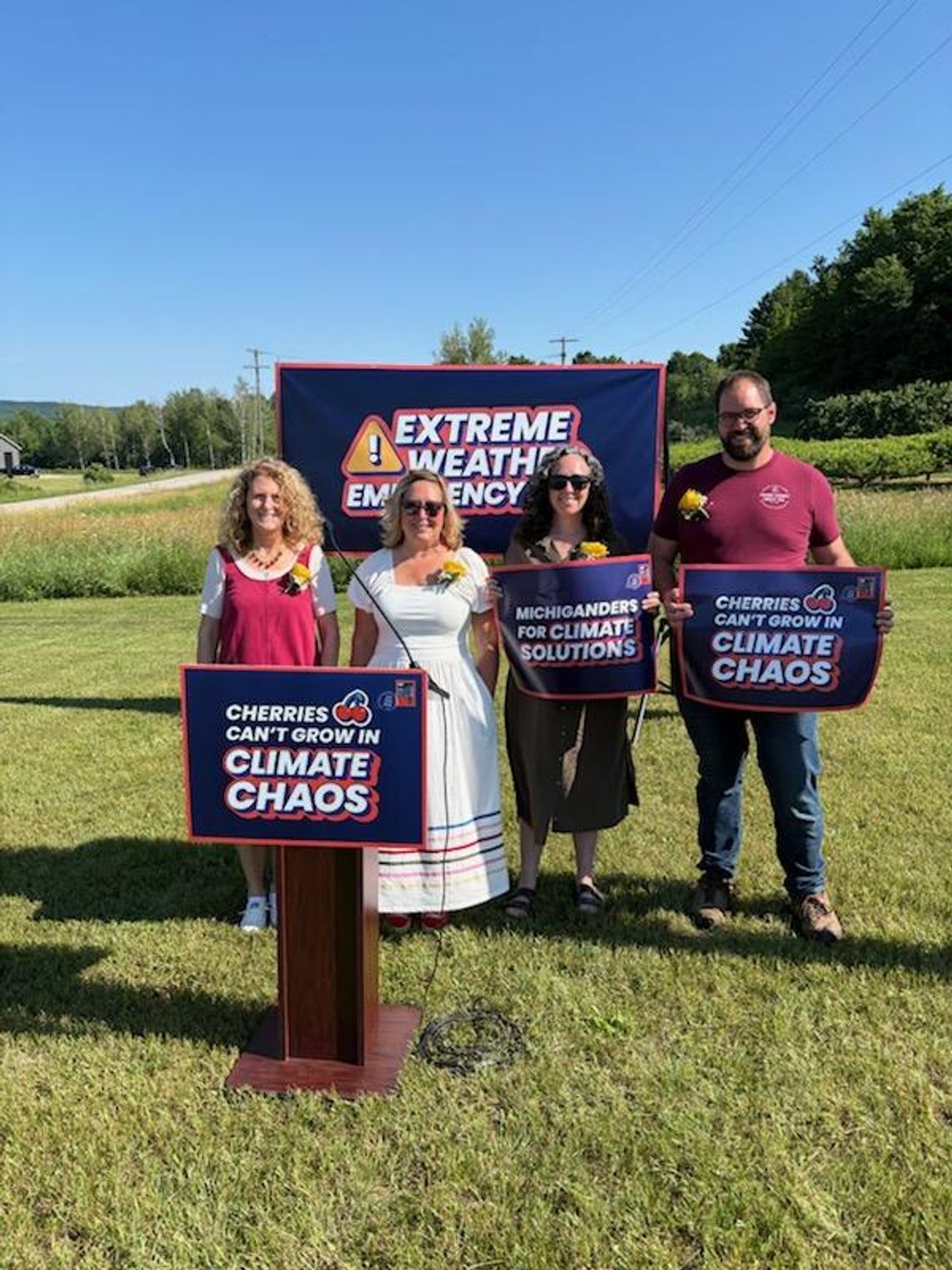Several local cherry farmers and elected officials gathered Friday for the second stop of the Climate Action Campaign’s Extreme Weather Emergency Tour, a four-state press tour highlighting how climate change is fueling extreme weather, making life increasingly costly for Leelanau farmers and Americans in general, at Eckerle Farm in Suttons Bay.
“The response was really good. People can tell that the weather has changed. We’re seeing changes within the cherry crops in the last couple of years,” cherry farmer Leisa Eckerle Hankins said. “It’s been over time. Still, the last two years, we’ve seen huge, huge issues with our crops, with major losses in 2024 in the sweet crop ... We saw quality decline in 2024 and the same thing happening this year. We saw in the very beginning, the freeze out with the tarts, but the quality is declining rapidly currently.”
Hankins is a Leelanau cherry farmer and owenr of Benjamin Twiggs.
Speakers shared firsthand accounts of the 2024 and 2025 growing seasons, which included devastating crop losses, fungal outbreaks, and rising insurance costs.
The event underscored the importance of investing in mitigating climate change to protect family farms, strengthen climate resilience, and preserve Michigan’s agricultural heritage from growing threats, such as cheap imports. Speakers also included Leisa Eckerle Hankins, Leelanau County commissioner Gwenne Allgaier, Isaiah Wunsch, Emily Miezio, Juliette King McAvoy, and Nikki Rothwell.
The farm at Eckerle’s has a receiving station that is typically open four weeks of the year.
“Sweets are going to be probably done in the next week or so, which is really unusual,” Eckerle said. “We just opened Friday, and the quality is declining.. This weather, the heat, we are seeing more and more brown rot and Spotted Wing Drosophila.”
Cherries, along with apples and grapes, are also seeing similar issues. Hankins states that they may see 20% of this year’s crop, regardless of whether it is for tarts or sweets.
“I looked at a box of sweets last night, and it’s sad to look in the box and see that they’re brown. It’s just brown rod everywhere,” Hankins said. “when I started the Michigan Cherry Alliance a year and a half ago, my goal was to bring farmers together, to have a voice and to be very positive, because I felt like some of the messaging that’s always been out there the last few years has been very negative. But on Friday, it was hard and we’re not whining. We work hard. It’s our livelihood, and it’s how we survive.”
No matter the weather, local cherry farmers are out there day and night trying to provide for their families and feed America with cherries.
“I have my 82-year-old father working alongside my 26-year-old son, and my son looks at me and he’s just like, Mom, how, how am I going to do this?” Eckerle said, “We can’t stop looking at what’s happening with our weather patterns, and we have to; we need continued support. You know, we can’t have cuts in our research because without it, we wouldn’t be able to look at how we deal with SWD and the fungus and other issues out there. We’re seeing research dollars being cut. We’re seeing data collection being cut.”
The speakers discussed various climate changes, including weather disruptions caused by erratic winters and early blooming, excessive rain and humidity, past and present disease surges, unusual freezes and weather patterns, wind exposures, milder winters, and warmer summers. Eckerle has heard from some of the major companies, including Coca-Cola, which know their orders are going to be smarter. Still, they don’t know how to meet the needs of cherry lovers around the world.
“We are asking our Michigan congressional delegation and helping us look at how do we address the climate pollution that’s causing the extreme weather? how do we address the cuts that we’re seeing at the federal programs? How can we reinstate some of those things and safeguard those? Just being very protective of Michigan’s agricultural economy and heritage,” Hankins said.
The tour will make stops in four states – Arizona, Michigan, Pennsylvania, and Georgia – detailing the impacts that worsening heat, storms, wildfires, flooding, and other extreme weather events are having on communities, especially our most vulnerable communities.
They also discussed how the Trump administration’s rollbacks of climate protection standards that are meant to address the root cause of extreme weather, and attacks on agencies like FEMA and NOAA, are exacerbating extreme weather and weakening disaster preparedness and response.



